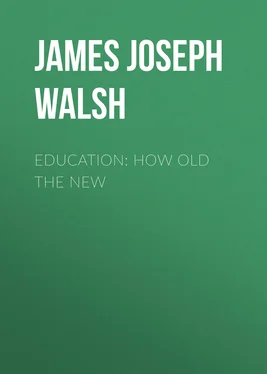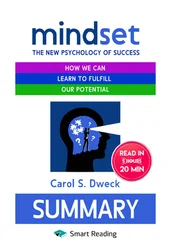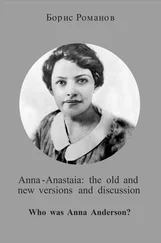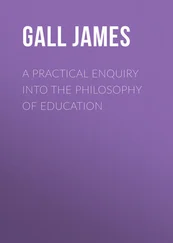James Walsh - Education - How Old The New
Здесь есть возможность читать онлайн «James Walsh - Education - How Old The New» — ознакомительный отрывок электронной книги совершенно бесплатно, а после прочтения отрывка купить полную версию. В некоторых случаях можно слушать аудио, скачать через торрент в формате fb2 и присутствует краткое содержание. Жанр: foreign_prose, foreign_edu, foreign_antique, на английском языке. Описание произведения, (предисловие) а так же отзывы посетителей доступны на портале библиотеки ЛибКат.
- Название:Education: How Old The New
- Автор:
- Жанр:
- Год:неизвестен
- ISBN:нет данных
- Рейтинг книги:3 / 5. Голосов: 1
-
Избранное:Добавить в избранное
- Отзывы:
-
Ваша оценка:
- 60
- 1
- 2
- 3
- 4
- 5
Education: How Old The New: краткое содержание, описание и аннотация
Предлагаем к чтению аннотацию, описание, краткое содержание или предисловие (зависит от того, что написал сам автор книги «Education: How Old The New»). Если вы не нашли необходимую информацию о книге — напишите в комментариях, мы постараемся отыскать её.
Education: How Old The New — читать онлайн ознакомительный отрывок
Ниже представлен текст книги, разбитый по страницам. Система сохранения места последней прочитанной страницы, позволяет с удобством читать онлайн бесплатно книгу «Education: How Old The New», без необходимости каждый раз заново искать на чём Вы остановились. Поставьте закладку, и сможете в любой момент перейти на страницу, на которой закончили чтение.
Интервал:
Закладка:
MEDIAEVAL SCIENTIFIC UNIVERSITIES
"Qui ad pauca respiciunt faciliter pronuntiant." –AN OLD PHILOSOPHER.
[Those who know little readily pronounce judgment.]
MEDIAEVAL SCIENTIFIC UNIVERSITIES 8 8 The material for this address was originally gathered for a lecture in a course on the History of Education delivered to the Sisters of Charity of Mount St. Vincent's, some 500 in number; teachers in the Catholic public schools of New York City, and for corresponding lectures to the Academy of the Sacred Heart, Kenwood. The address was delivered substantially in its present form at the Catholic Club of Cornell University, under the title "The Relations of the Church to Science."
Probably nothing is more surprising to any one who knows the history of science and of scientific education than the attitude of mind of the present generations, educated as they are mainly along scientific lines, toward the supposed lack of interest of preceding generations in science. Our scholars and professors seem to be almost universally of the opinion that the last few generations are the first who ever devoted themselves seriously to the study of science, or who, indeed, were free enough from superstitions and persuasions and beliefs of many kinds to give themselves up freely to scientific investigation. In the light of what we know or, perhaps I should say, what we are coming to know now with regard to the educational interests of the men of the various times, this would be an amusing, if it were not an amazing, presumption on our part. Over and over again in the world's history men have been interested in science, both in pure science and in applied science, in the culture sciences and in the practical sciences.
Apparently men forget that philosophy is science and ethics is science and metaphysics is scientific and logic is science and there is a science of language. Of course the protest that will be heard at once is that what we now mean by science is physical science. Even taking the word science in this narrower sense, however, how can people forget that our mathematics comes to us from the old Greeks, that old Greek contributions to medicine and, above all, to the scientific side of it still remain valuable, that physical science, pure and applied, developed wonderfully at the University of Alexandria, that there was a beginning of chemistry and the great foundations of astronomy laid in the long ago, and that men evidently were quite as much interested in the problems of nature around them as they have been at any time: Archimedes insisting that if he only had some place to rest his lever he could move the world, inventing the screw pump, fashioning his great burning-mirrors, and a little later Heron inventing the first germ of the turbine engine, while all the time their colleagues and contemporaries were developing the mathematics in connection with them, are studying both pure and applied science. It is simply failure to state in terms of the present what was accomplished in the past, that has permitted people to retain curious notions of the absence of science in antiquity.
Probably most people would be quite ready to concede, and especially after even a brief calling to their attention of some educational facts, that the old Greeks did enjoy a scientific educational development; it would probably even be admitted that the traditions of science of various kinds from Egypt, from Chaldea, from Babylonia point to previous eras of scientific development. They would probably still insist, however, that there had been a long interval of utter neglect of science lasting nearly 2,000 years and that our interest is properly a resurrection of science-study after a long burial. They do not even hesitate to blame the educational authorities of the interval for their failure to occupy themselves with scientific ideas and are prone to find reasons of various kinds to account for this failure. As the Church was dominant in education during the Middle Ages this makes a ready scapegoat, and so we have heard much of the repression of scientific study by the ecclesiastical authorities, and the determined effort made to keep men from inquiring about the problems of nature around them, because this would lead them to think for themselves and have doubts with regard to faith. Indeed this attitude of mind in the history of science is so usual that it is a commonplace, and men who are supposed to be scholars talk off-handedly of direct Church opposition to science.
There is no doubt at all that the Church was the commanding influence in education during the Middle Ages. Whatever was studied was taken up because the Church authorities were interested in it. Whatever was not studied was absent from the curriculum because of their lack of interest. While study was magnificently encouraged there were many subjects, though not near so many as is often thought, that were repressed. The Church must certainly be held responsible in every way for the teaching of the Middle Ages, both as regards its extent and its limitations. The charters of the universities were granted by the Popes. The universities themselves usually were cathedral schools which had developed, and to which had become attached various graduate departments. The ecclesiastical authorities were in control of them. The rector of the university was usually the archdeacon of the cathedral or the chancellor of the diocese. The professors at the universities were practically all of them in clerical orders, and the great body of the students were clerics, in the sense that they had assumed at least minor orders and were supposed to be in preparation for a clerical life. This was, indeed, the one sure way to secure exemption from the military duties of the time and to prevent interference of various kinds by the civil power with the leisure necessary for study. No man had any essential rights in the Middle Ages except such as were conferred on him by some organization to which he belonged, and the clerical order was particularly powerful.
Now the interesting phase of the education afforded by these universities under ecclesiastical control with clerical students and professors constituting the large majority of members, with the influence of the religious orders paramount for centuries, is that it was entirely scientific in character and largely occupied with the physical sciences, though the culture sciences formed the basis of it. Huxley, though he is surely the last man of recent times who would be suspected for a moment of exaggerating the scientific significance of mediaeval education, recognized this fact very well and stated it very emphatically. In his Inaugural Address on Universities Actual and Ideal, delivered as Rector of Aberdeen University after discussing the subject with evident careful preparation, he said:
"The scholars of the mediaeval universities seem to have studied grammar, logic and rhetoric; arithmetic and geometry; astronomy, theology and music. Thus, their work, however imperfect and faulty, judged by modern lights, it may have been, brought them face to face with all the leading aspects of the many-sided mind of man. For these studies did really contain, at any rate in embryo, sometimes it may be in caricature, what we now call philosophy, mathematical and physical science and art. And I doubt if the curriculum of any modern university shows so clear and generous a comprehension of what is meant by culture, as this old Trivium and Quadrivium does." (Italics mine.)
Of course Huxley says, "sometimes it may be in caricature." We must not forget, however, that first even Huxley hesitates to say that it is caricature, for he knows how easy it is to be mistaken in our estimation of the true significance of an old-time mode of thought, and then, too, he knew comparatively how little we were sure of the real thoughts and conclusions of these men of the olden time because of defective sympathy and even defective knowledge of their work. Our knowledge in this matter has greatly increased since his time. As a matter of fact, the more we know about these old masters and the mediaeval universities the less are we likely to think of their work as lacking in seriousness in any sense. The quarter of a century that has elapsed since Huxley so cogently urged this at Aberdeen has brought many facts unknown to us before and has shown us what good work, even in the physical sciences, was accomplished in these old-time universities.
Читать дальшеИнтервал:
Закладка:
Похожие книги на «Education: How Old The New»
Представляем Вашему вниманию похожие книги на «Education: How Old The New» списком для выбора. Мы отобрали схожую по названию и смыслу литературу в надежде предоставить читателям больше вариантов отыскать новые, интересные, ещё непрочитанные произведения.
Обсуждение, отзывы о книге «Education: How Old The New» и просто собственные мнения читателей. Оставьте ваши комментарии, напишите, что Вы думаете о произведении, его смысле или главных героях. Укажите что конкретно понравилось, а что нет, и почему Вы так считаете.












